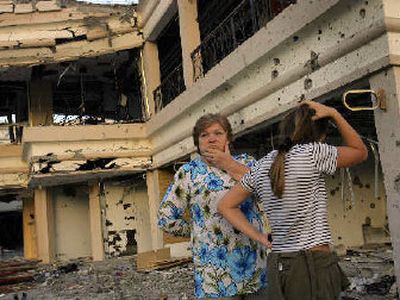Death toll rises after bombings in Egyptian city

SHARM EL SHEIK, Egypt – The death toll from predawn blasts here climbed to at least 88 Saturday as dazed emergency crews combed the wreckage for victims in the brazen attack on a seaside resort well-known for its thick presence of intelligence and security agents.
Two shadowy organizations, including one that professes to be linked to al Qaeda, gave competing claims of responsibility for the three large explosions that echoed in quick succession over the Red Sea coast. The blasts gutted a luxury hotel, devastated a shopping center and left a popular taxi stand slick with the blood of tourists. At least 119 people were wounded.
Launched on the anniversary of the 1952 revolution that overthrew the Egyptian monarchy, it was one of the deadliest terrorist strikes ever experienced by this often-bloodied country. Condemnations poured in from dignitaries around the world.
The Interior Ministry indicated that most of the dead were Egyptians, but Britons, Dutch, Kuwaitis, Qataris, Saudis, Czechs, Germans and Italians reportedly also were killed in the blasts. It could be some time before all the victims are known – dozens of bodies reportedly were charred beyond recognition.
Egyptian President Hosni Mubarak flew here Saturday to inspect the damage and visit victims in the hospital. Later, he grimly vowed to hunt down the bombers who had penetrated his prize tourist haven and exposed a weak spot in Egypt’s powerful intelligence services.
Mubarak owns a villa in Sharm el Sheik, and the city has served as a showcase for Egypt’s Middle East peacekeeping efforts during innumerable international summits.
“This cowardly, criminal act is aimed at undermining Egypt’s security and stability and harming its people and its guests,” Mubarak said in televised remarks. “This will only increase our determination in chasing terrorism.”
The blow is particularly keen for Mubarak, who is expected to nominate himself this month to run in Egypt’s first presidential election. At a time when Mubarak is striving to remind Egyptians of his military prowess and steady – if autocratic – hand, the explosions hint that the country has slipped into a state of low-level battle.
When the attacks began, the tourists who haunt the lively, gaudy shorelines of the Sinai Peninsula were still smoking water pipes under the stars, tossing back beers and shopping for bottled water and postcards at late-night convenience stores.
Not long after 1 a.m., two powerful car bombs tore through the summer night. The first rocked the Old Market, a knot of strip malls adorned with Roman arches and flush with souvenir shops. The blast tore through a patch of pavement where microbuses load up for trips, and the damage was flung in a wide arc.
“Those are the buses that all the Egyptians use to go back home,” said Osama Ahmed, a 25-year-old merchant who huddled in a slim wedge of shade Saturday to watch investigators pore over the twisted cars. “We saw bodies without arms, without legs. It was an untold scene. Horrible.”
Around the same time, a second automobile rigged with explosives raced up the driveway to the sprawling Ghazala Gardens Hotel, slammed its way into the reception hall and blew up. The luxury hotel had been packed with vacationers gathered in the bar, in the Italian restaurant and in the lobby.
“I saw a lot of panic, a lot of running, a lot of smoke,” said Samy Negah, an Egyptian journalist vacationing here. “I saw bodies on the ground, dead people.”
In the third attack, a bomb might have been hidden in a bag and abandoned at a taxi stand where frightened tourists had dashed after the first bombs went off. Several witnesses said they saw a man drop the bag onto the ground and jump into a taxi.
“I saw some guy rushing, saying, ‘Taxi, taxi, taxi.’ He threw a bag outside the car and then he drove away,” said Mohamed Mustafa, a 27-year-old cafeteria worker who was walking his dog past the taxi stand.
Mustafa said he didn’t think much of the abandoned bag at the time. All around him, people were panicked, behaving irrationally. Then the bomb went off.
In style and geography, the attacks echoed a series of coordinated bombings that erupted in the Sinai resorts of Taba and Nuweiba in October, killing 34 people.
Because those resorts lay close to the Israeli border, and because many of the victims were Israeli tourists, some Egyptian officials argued that the blasts were an outgrowth of the Palestinian intifada rather than a salvo in an internal struggle.
But Interior Minister Habib Adli, who surveyed the damage Saturday and called the strikes “an ugly act of terrorism,” told reporters that the attack probably was linked to the October bombings. “We have some clues, especially about the car that was exploded in the Old Market, and investigators are pursuing (them),” he said.
The first group to claim responsibility for the weekend attacks calls itself the Abdullah Azzam Brigades, al Qaeda, in Syria and Egypt. The same organization claimed responsibility for the October bombings and for a pair of minor attacks that struck tourist sites in Cairo this spring.
The second claim emerged a few hours later when the previously unknown Holy Warriors of Egypt faxed a statement to newspapers saying it had carried out the attacks.
At least 43 foreigners were wounded in Saturday’s attacks: 13 Italians, nine Britons, five Austrians, five Germans, four Spaniards, a Czech, an Israeli Arab, two Saudis, two Kuwaitis and a Qatari.
No U.S. citizens were reported hurt or missing in the attacks, a U.S. Embassy spokesman said.